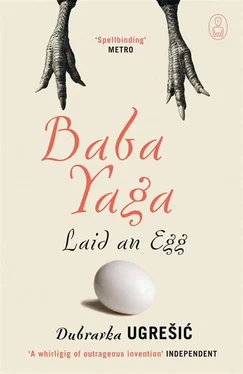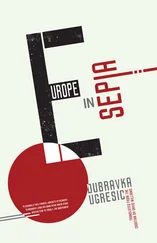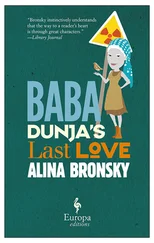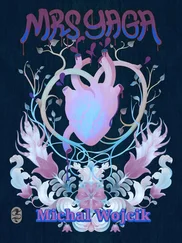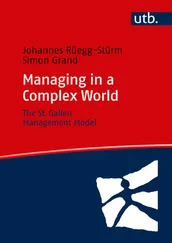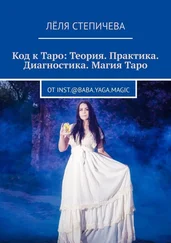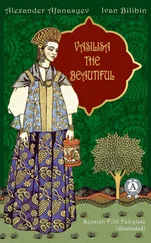* * *
The most inspiring interpretation of the clean–dirty antithesis is Mary Douglas’s classic study Purity and Danger: An Analysis of the Concepts of Pollution and Taboo . The coordinate system of ‘clean– dirty’ structures practically every primitive social community, where thinking about the world, behaviour and customs has been organised via an elaborate system of taboos. Purity, however, which is not a symbol but rather a part of our emotional make-up, can be a way to petrification. Purity is the pledge of our security, it is the enemy of change, ambiguity and compromise.
Interestingly, then, our de-tabooed age, an age of ‘leaving home’ for a space of chaos, is obsessed with cleanliness. Most television adverts, for example, advertise cleaning materials (for our homes, bodies or clothes) and are forever warning us with the formula ‘clean: positive, dirty: negative’. Even the ‘dirty’ has become the ‘cleansed’. Thanks to the media (the Internet and television), in fact, we can indirectly take part in ‘dirty’ things (pornography, sex, war, misery, natural disasters, murders, collective misery, poverty and so forth) while staying clean!
According to the Encyclopaedic Dictionary of Slavic Mythology , the egg is the beginning of all beginnings, the symbol of fertility, vitality, the renewal of life and resurrection. In the cosmogonic myths of the South Slavs, the egg is a protoimage of the cosmos. In South Slavic children’s riddles, ‘God’s egg’ is the sun and ‘a sieve full of eggs’ is a starry sky. Slavs believed that the whole world was a gigantic egg: the heavens were the shell, the water was the white, the clouds were the membrane and the earth was the yolk. There is a riddle: ‘The living gives birth to the dead, and the dead gives birth to the living’, which contains the old scholastic inquiry: ‘Which came first, the chicken or the egg?’ – and the answer that Silesius gave: ‘The egg is in the chicken, and the chicken is in the egg.’ [48] 37 It suffices at this point to remind you of the couplet, quoted above: ‘We move around with silver oars, our vessel is an eggshell’ – meaning Baba Yaga’s mortar or womb, which is the daughter’s and the mother’s at the same time ( stupushka–matushka )!
Symbolising as it did the renewal of life and resurrection, the egg played an important part in funeral rites. An egg would be placed in the dead person’s hands, or in the coffin, or it would be dropped into the grave and buried with the coffin, so that the deceased could come back to life one day. Earthenware eggs have been discovered in Russian and Swedish crypts; statues of Dionysus with eggs in his hand have been found in Beotian graves. The same semantics of the renewal of life define Slavic and other rituals at Easter: painting eggs, decorating trees with eggs, hunting for Easter eggs and so forth. Slavs would place an egg in the first furrow ploughed in a field, and scatter bits of eggshell around the field to make the harvest a good one. Because of their multiple symbolic value, eggs could be used in many situations. People believed that eggs could stop a fire from spreading. If a fire broke out at home, the members of the household would surround the house with eggs in their hands. According to some folklore beliefs, if a man carries a rooster’s egg in his armpit for forty days, a guardian spirit will emerge from the egg and bring the man great wealth.
The egg is a universal symbol. The mythopoetic image of the world emerging from a cosmic egg is common to many peoples: the Celts, the Greeks, the Egyptians, the Phoenicians, the Tibetans, the Indians, the Chinese, the Japanese, the Finns, and others besides. The world was born from an egg, and in some traditions the first human being likewise (Prajapati, Pan Gu). Heroes, too, came out of eggs (if the mother ate the egg). Castor and Pollux, the sons of Leda and Zeus, were born from eggs.
The notion of the world being born from an egg, and of splitting the egg in half, has many variants. The Egyptians imagined that the egg appeared on top of a hill that emerged from the waters of the primordial ocean, Nuna. The god Khnum came out of the egg and created the variety of beings. According to the traditions of Canaan, in the beginning was the ether from which Ulomos (Boundlessness) was born. Ulomos gives birth to the cosmic egg and to Shansora, the creator. The creator breaks the cosmic egg in two and makes heaven out of one half and earth out of the other. According to Indian cosmogonic beliefs, Being springs out of non-Being, and Being gives rise to the egg that cracked in two: a silver half and a golden half. The silver shell became the earth and the gold, the heavens. The outer membrane gave rise to the mountains, and the inner, to the clouds. The tiny veins in the egg became rivers, and the bubble of water in the egg became the ocean. In Peruvian myths, the Creator begs the Sun to make people and populate the world with them. The Sun throws three eggs down to the earth: the higher estates are born from the golden egg, their wives come out of the silver one and the ordinary folk emerge from the copper egg. For some African tribes, the egg is absolute perfection, for the yolk represents the ovum and the white, the sperm. Everyone should aim for perfection – in other words, to become an egg.
Simply lying on eggs has a symbolic significance. Certain Buddhist sects revere hens, for a hen sitting on a clutch of eggs symbolises spiritual centredness and fertilisation of the spirit.
Remarks
The egg symbolism in your author’s text is plain to see. Apart from the title, Baba Yaga Laid an Egg , and the spectacular egg-coffin, let me remind you of the obscure episode where the author spits out a tiny breathing body, all wet from tears and saliva , into the palm of her hand, which is already damp with tears and snot. In this ooze (or egg), she makes out a deformed miniature likeness of her mother, just as Beba dreams of an egg in which she can see her own son, in miniature, curled in the foetal position. An egg is simultaneously tomb and womb. In the Russian tale, the emperor’s daughter’s love is hidden in an egg, the very same that Mevludin offers Rosie as his ‘heart on a silver platter’.
In Russian folk traditions, the hen’s god is a ritual object, or amulet, that watches over hens. A stone with a hole in the middle, a clay pot, a dish with no bottom, old worn-out slippers: anything like this can serve as the hen’s god. Usually it would be hung up in the henhouse or the yard in front of the henhouse. The hen’s god guaranteed that the hens could lay eggs continually and it drove away spirits, mostly nasty brownies ( domovye, doma i ) and Kikimora . An old cracked pot stuck on top of a pole or tree could catch the eye of a passer-by and so avert his bewitching gaze from the household. A hole in the pot, a dish without a bottom, a cracked jug: these were all symbols of mature female sexuality and fertility. A pebble with a hole in the middle had an additional purpose: to protect its owner from toothache.
Remarks
I would draw your attention to one detail: Beba, representing mature female sexuality, carries an unusual amulet or charm around her neck – a flat stone with a hole in the middle.
Birds appear in all mythopoetic systems and traditions as demiurges, deities and demons; a means of transport for the gods, demigods and heroes; celestial messengers, wizards, immortals, prophets and totemic symbols. Although the symbolism associated with birds is rich and multilayered, birds are above all symbolic postmen, intermediaries between heaven and earth.
Читать дальше
